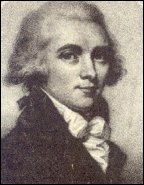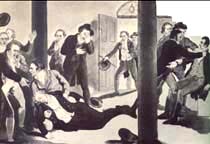
Spencer Perceval, only British Prime Minister to have been assassinated, served in that office from 4 October 1809 to 11 May 1812. He was born on 1 November 1762, the second son and fifth of nine children born to John Perceval, second Earl of Egmont, and his second wife Catherine Compton. From his father's first marriage, Spencer Perceval had seven half-brothers and sisters. The family was Irish in ancestry.
Perceval was educated at Harrow and Trinity , Cambridge, being awarded his College's Declamation Prize for English. He was awarded an MA in 1782 and was called to the Bar in 1786, practising on the Midland Circuit. He became Deputy Recorder of Northampton in 1790, the year in which he married Jane Spencer-Wilson in 1790: the couple had six sons and six daughters. Between 1794 and 1803, during the French Wars, Perceval was a member of the London and Westminster Light Horse Volunteers.
In 1796, Perceval became MP for Northampton, a seat which he held until his death in 1812. During his time as an MP, he held a number of government posts including that of Solicitor General (Jan 1801-April 1802), Attorney General (April 1802-February 1806) and Chancellor of the Exchequer (March 1807-May 1812).
Perceval was always a supporter of the government and this brought sinecures which kept him solvent until his legal career took off. He was the chief legal adviser to the Princess of Wales in the hearing of misconduct held in 1806; although she was found guilty of 'grossly indelicate conduct', Perceval was instrumental in arranging her reconciliation with George III. Always anti-Catholic, Spencer Perceval opposed Grenville's government's attempt to introduce concessions to Catholics in Ireland in 1807, thus contributing significantly to the fall of the ministry.
Spencer Perceval was almost 47 years old when George III appointed him as Prime Minister on 4 October 1809. Perceval's lasting claim to fame is that, so far, he is the only British PM to have been assassinated. As a politician, Perceval was industrious, well-organised, and capable. He held the posts of PM and Chancellor of the Exchequer concurrently; while he had a conservative outlook on society, he supported the anti-slavery campaign led by Wilberforce. He was a successful finance minister but opposed concessions to Catholics, particularly in Ireland.
Perceval's political career prior to his appointment as PM included him holding the post of Chancellor of the Exchequer in Portland's second ministry. In May 1807 the general election strengthened Portland's majority and proved to be Perceval's last electoral contest. On 26 June the new Parliament met to hear the King's Speech, written largely by Perceval; on 7 July 1807 following Napoleon's successes at Eylau and Friedland, the Treaty of Tilsit was signed by the Czar and Emperor. It was thought to contain secret threats to besiege Britain. Consequently, the Government ordered a pre-emptive strike against the Danish fleet at Copenhagen after which the Danes surrendered.
On 11 November there was fierce opposition in Parliament both to the action against Denmark and to the Orders in Council subsequently drafted by Perceval, designed to impose retaliatory trade restrictions on neutral countries. His Bill eventually was passed on 11 March 1808; in February his Budget had to cover expenditures of about £49 million. War taxes were estimated to produce only £20 million, and after other duties and taxes and with lottery income of £350,000 a total of £8 million had to be borrowed.
Beginning on 8 March, 1809 a three-day debate took place on a motion calling for the removal of the Duke of York as Commander-in-Chief. The issue arose from the practice of the Duke's mistress, Mary Clarke, of taking payments for arrangingappointments and promotions. Perceval's three-hour speech responding to the debate was widely acclaimed and a few days later the Duke of York resigned. In August and September, the illness of the Duke of Portland added to the weakness of his administration, which split into factions. Canning gathered supporters in his bid to take over as Prime Minister, but Perceval was also a serious candidate, and on 4 October 1809 the King decided to appoint Perceval, describing him as 'the most straightforward man I have ever known'. Even so, Perceval had great difficulty in filling posts in his Cabinet, and had to keep the office of Chancellor of the Exchequer himself, being unable to find a replacement.
On 23 January 1810, parliament met to debate the Kings' Speech; Perceval made a long speech in which he refuted the Opposition's criticisms of the conduct of the war against France and the disastrous Walcheren expedition. The Opposition was soundly defeated at the vote. However, three days later the Opposition launched another attack on the conduct of the Walcheren expedition, and the government was defeated by 195 votes to 186. On 28 January the government was defeated in three successive divisions on the composition of the Finance Committee, which was largely made up of friends of Perceval; the ministry's problems continued. On 31 March 1810, the government narrowly survived four divisions following the publication of the findings of the Walcheren enquiry. However, the reputation of the (second) Earl of Chatham, who had ordered the expedition, was damaged, and later he resigned. A furore erupted over the arrest of Sir Francis Burdett in April: he had supported the 'rights of the people and press' to watch and report proceedings in the House of Commons and was sent to the Tower, amid widespread rioting in his support. He was released in June after parliament had gone into recess.
In May, Perceval's Budget proposals were accepted, despite his worse fears, although the report of the Bullion Committee criticised the Bank of England and precipitated a financial crisis which lasted for over a year. By 18 October 1810, the king had become deeply distressed by the terminal illness of his favourite daughter, Princess Amelia; the first signs of the return of his insanity were observed. Consequently, on 19 December, Perceval informed the Prince of Wales that the Cabinet had agreed on the terms of a Regency Bill which included several restrictions on the Regent's powers. Angered, the Prince led the opposition to Perceval's proposals. Even so, the Regency Bill passed on 4 February 1811, a personal triumph for Perceval, although the Prince immediately begins to plan changes in the Cabinet. The King's health gradually began to improve and the Prince decided to confirm Perceval as PM.
By July, raging inflation had set in as a consequence of war, but the financial crisis ended when Perceval made bank-notes legal tender. At the same time, the Prince Regent asked for a large grant for the maintenance of the Royal Household and to pay off his phenomenally large debts. The Prince's financial difficulties led to Perceval persuading him to accept a smaller settlement financed from the Civil List, a practise that has continued ever since.
From the beginning of 1812, the government suffered the withdrawal of various of its members . On 17 January, Wellesley, who had openly supported the Prince Regent, offered his resignation as Foreign Secretary. On 31 January Charles Yorke resigned from the Admiralty on the grounds of ill health but in reality had an aversion to serving the Prince Regent. On 7 February Perceval had an audience with the Prince to discuss offering Opposition leaders places in a coalition government. Their acceptance was so unlikely that Perceval was confirmed in office as the best candidate available.

Detail of an etching showing the assassination of Spencer Perceval
As one result of the activities of Thomas Attwood, a Birmingham banker who had led a campaign against the Orders in Council that had been imposed in 1807, Perceval's government agreed to an enquiry into the legislation; his decision partly was the result of Attwood's activities but also partly because of the adverse effect they were having on Anglo-America relations. These erupted into the War of 1812-14.
On 11 May 1812, while on his way to take part in a debate on the Orders in Council passed by Portland's ministry, Perceval was shot in the lobby of the House of Commons by John Bellingham, who had been trying unsuccessfully to obtain government compensation for debts incurred while he was in Russia. Bellingham gave himself up immediately, was tried at the Old Bailey, condemned to death on 15 May, and he executed three days later. The inquest into Perceval's death returned a verdict of wilful murder and his body was returned to Downing Street. The following day, parliament voted an annuity to Perceval's wife and children. Perceval was buried in the family vault in St. Luke's, Charlton, on 16 May 1812. In June 1812, a memorial to Perceval was placed in Westminster Abbey.
Recommended Reading
Gray, D. Spencer Perceval: the Evangelical Prime Minister 1762-1812. Manchester 1963.
Williams, CV. The Life and Administration of the Right Hon. Spencer Perceval. London, 1812.
Last modified 28 February 2002